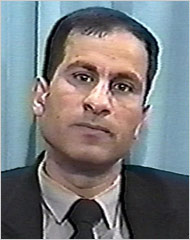
TV REVIEW | 'TRIPLE CROSS'; 'THE FINAL REPORT'
Slipping Through the Cracks: Bin Laden’s Mole
Published: August 28, 2006
About halfway through “Triple Cross: Bin Laden’s Spy in America,” tonight’s enlightening documentary about the Egyptian-born superspy Ali A. Mohamed on the National Geographic Channel, something bizarre happens. A retired Army officer, Robert Anderson, discusses working with Mr. Mohamed at Fort Bragg, N.C., in the late 1980’s. Those were the days when the handsome, audacious spy was cooling his heels in the United States Army.

“I said to him,” Lieutenant Colonel Anderson recalls. “ ‘You know, Anwar Sadat was not only a hero to Egypt, but he was also a hero to the United States, and the entire free world.’
“So his response to me was, ‘He was a traitor, and he had to die.’ ”
That’s when the penny should have dropped, but it didn’t. The bizarre part comes in voice-over. “Colonel Anderson,” says the matter-of-fact narrator, “allows Mohamed to remain in his unit, in spite of his misgivings.”
In spite of his misgivings? Mr. Mohamed, who moved on to bigger and more horrible things, must have thought espionage in the United States was a piece of cake. It’s like one of those sad American education stories in which a student who can’t read keeps slipping through the grades, until he finally graduates from high school. Only here graduation day is Sept. 11, when the support Mr. Mohamed has given Osama bin Laden — smuggling him in and out of Afghanistan, writing the terrorist training manual for Al Qaeda and helping to mastermind attacks on American embassies in Africa — pays off in spectacular destruction and carnage.
Mr. Mohamed’s story, which was first chronicled in a forthcoming book by the investigative reporter Peter Lance, is one of appalling oversights by American national security, including the C.I.A., the F.B.I. and the Army. (Mr. Lance, who originally intended to provide narration for the documentary, has since distanced himself from it.) As a documentary, it’s little more than a show-and-tell of maps, portraits, news images, stock film, overstyled re-creations, talking heads and gee-whiz establishing shots of places like Fort Bragg and the Javits Center in Manhattan.
The effect is of earnest opening statements by a prosecutor to a doltish jury, looking to convict Mr. Mohamed. No detail goes unmentioned and uncued: every reference to the blind sheik, Omar Abdel Rahman, for example, brings up images from the same news conference. And nearly every time Mr. Mohamed is mentioned, the same videotape plays from a single bluish video that the spy made to help Americans understand radical Islam.
This returning again and again to master-of-the-obvious images does not flatter viewer intelligence. But maybe that’s not the point. American intelligence does not need to be flattered; it needs to be challenged. And this is remedial work we’re doing now. “Triple Cross” amply reveals just how obvious Mr. Mohamed’s deadly trajectory should have been, for anyone who knew what to look for.
“The Final Report: Osama’s Escape,” which appears tomorrow night on the National Geographic Channel, hammers on the same point: We’re not getting it. President Bush said he wanted Mr. bin Laden “dead or alive” in 2001; that same year Gen. Tommy Franks insisted we were “tightening the noose.” A $20 million reward was offered for the terrorist’s capture. In 2004 it was increased to $50 million. We’ve fought on the mountains, in the desert, in the caves. Nothing.
How did Mr. bin Laden get away? This program addresses the failures of the United States Army at Tora Bora in Afghanistan and then goes back to give a history of Mr. bin Laden as a strategist and commander. It’s a considered, detailed, unromantic history: a post-hoc account of the ways that American forces have repeatedly missed Mr. bin Laden.
Like “Triple Cross” it’s not a particularly inventive program; it’s closer to PowerPoint than documentary. But once again the channel erects a powerful timeline of failure by American military and intelligence. Does the old guard at National Geographic believe they could have done a better job?
TRIPLE CROSS
Bin Laden’s Spy in America
National Geographic, tonight at 9; Eastern and Pacific times; 8, Central time.
Based in part on the book “Triple Cross” by Peter Lance. Produced for National Geographic Channel by Towers Productions Inc.

